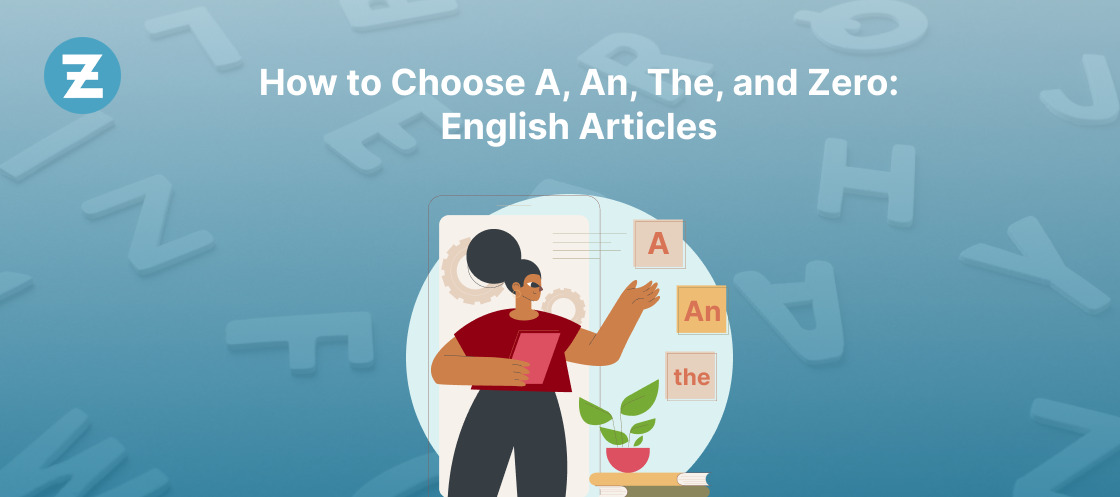When it comes to English proverbs, they are often more than meets the eye. These wise sayings, handed down from generations, contain a wealth of wisdom, teaching us lessons on life, love, friendship, and more. From humorous to profound, each proverb has a unique meaning that can help us daily. In this blog post, we will explore some of the most famous English proverbs and the profound meanings behind them.
Actions speak louder than words.
The proverb “Actions speak louder than words” has been around for centuries and is as relevant today as ever. This simple phrase reminds us that our actions are more powerful than words.
The proverb is a reminder to us that we are judged by our actions, not by our words. We can say all sorts of things, but our words will be meaningless if we don’t act on them. Our actions define us, and they are more powerful than any words we utter. This proverb can be applied to our personal and professional lives, and in any situation, we try to demonstrate our commitment. We can talk all we want about our commitment to a project or a relationship, but if we don’t take the necessary steps to make it happen, our words will be hollow.
It’s also important to remember that actions speak louder than words regarding our relationships. We can talk about how much we care for someone, but if we don’t follow through with our words and back them up with our actions, our words will be meaningless.
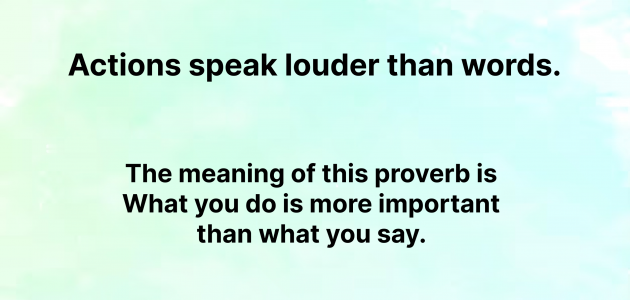
Don’t count your chickens before they hatch.
The proverb “Don’t count your chickens before they hatch” is an adage that has been around since the 17th century. It warns people not to get too carried away with expectations of something happening, especially if you’re counting on it.
The phrase is usually used to warn against overly optimistic thinking. It’s a reminder that waiting and seeing what happens before counting on a certain outcome is more prudent. When you “count your chickens before they hatch,” you’re jumping the gun and assuming something will happen when it might not.
This proverb often describes a person’s attitude regarding business ventures, investments, and hobbies. For example, if you’re starting a business and counting on it to make you a certain amount, you might be counting your chickens before they hatch. It’s important to remember that things don’t always turn out how we expect them to, and it’s wise to wait and see what happens before counting on a certain outcome.
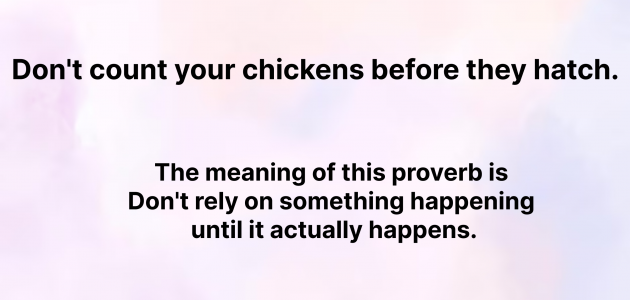
Honesty is the best policy.
One of the most essential qualities that a person may have is honesty. It is often said that “honesty is the best policy,” meaning it is always better, to be honest than to lie or deceive someone. This proverb has existed for centuries, and its meaning is still relevant today.
Honesty means being truthful and genuine in all aspects of life. It entails being honest to oneself and to others. Honesty is not only the best policy but also the foundation of any successful and meaningful relationship. When you are honest with someone, you show them you trust and value their opinion. This helps to build strong relationships and helps to create a positive environment.
It also means being open about your thoughts and feelings. When you are honest with someone, you are allowing them to have an insight into who you are, and you are being true to yourself. Honesty helps to build trust and respect with those around you, and it can help you to achieve success in all areas of life.
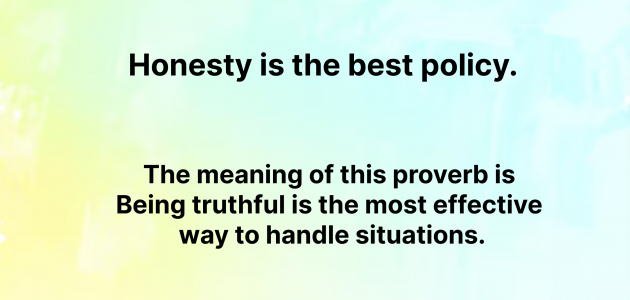
All’s fair in love and war.
The proverb “All’s fair in love and war” is one of the most iconic and widely-recognized phrases in English. It is a proverb that has been used for centuries to convey the idea that no matter the situation, there are no rules for matters of the heart or matters of battle.
The saying originated in medieval Europe, but its exact origin is unknown. Some suggest that it was a phrase used by knights to justify the brutal methods they used on the battlefield. Others believe the phrase was born out of the romantic notion that anything goes when it comes to love.
In its most basic sense, “all’s fair in love and war” means people are willing to do whatever it takes to win in either situation. This could mean taking advantage of an opponent, manipulating the situation, or using any tactics available. It expresses that the ends justify the means and that the rules of right and wrong do not always apply.
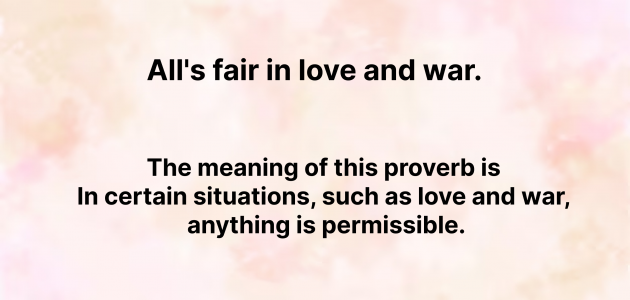
Read Also: Everyday Phrases You Might Be Saying Incorrectly
Don’t put all your eggs in one basket.
Don’t put all your eggs in one basket is an old saying with a simple meaning: don’t rely on just one thing to get the job done, or put all of your efforts into one thing.
This saying is applicable to many spheres of life. If you are investing money, it is wise to diversify your investments so that if one fails, you still have other sources of income. Similarly, if you are looking for a job, you should apply to multiple places and not rely on just one job opportunity. When it comes to relationships, investing your time and energy in different people is important so that if one relationship fails, you have other people to turn to.
The proverb also emphasizes the importance of resilience in the face of failure. By diversifying your investments, you can avoid putting all your eggs in one basket and be prepared for the worst-case scenario. This can help you keep your head up during hard times and focus on the bigger picture.

Let sleeping dogs lie.
The proverb “Let sleeping dogs lie” is a reminder to not stir up trouble or disturb something better left alone. It implies that things can often be better off left as they are and that any effort to change them might result in more trouble than it’s worth.
In a wider sense, this proverb can be interpreted as a warning to not meddle in matters that do not concern us. We should not act in a way that causes unnecessary conflict. It is a reminder to stay out of other people’s affairs and not interfere in matters we do not understand.
The proverb originated in the 1500s and was likely derived from the proverb “Let sleeping horses lie,” which was used as a metaphor for leaving something undisturbed.
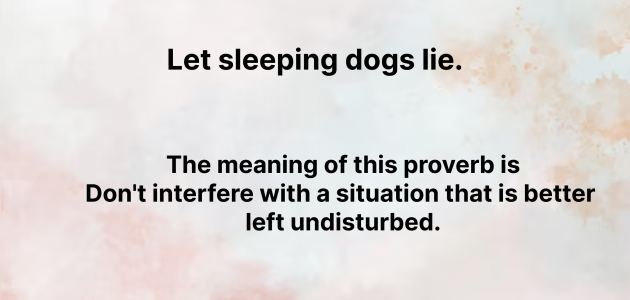
Every cloud has a silver lining.
“Every cloud has a silver lining” is a positive statement. It implies that even when things look dark and hopeless, there is always a glimmer of hope. No matter how bad a situation may seem, something good can always come out of it.
The proverb has been used for centuries to express the idea that every negative situation has a positive side. The phrase often reminds people to remain hopeful in times of adversity. It encourages people to look beyond the current situation and find a way to make the most out of it.
The proverb is often used to emphasize the importance of staying positive. It encourages us to recognize that things may seem bleak, but something good can come from them. It reminds us that, in times of difficulty, we should still have faith that things will improve.
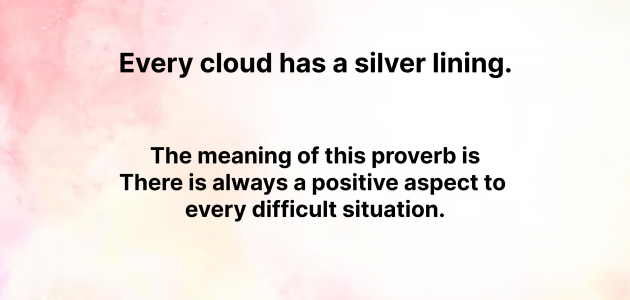
No pain, no gain.
No Pain, No Gain is an age-old proverb used to motivate and inspire people for centuries. The proverb means that if you want to achieve something, you must be willing to put in the hard work and dedication to achieve it. It often motivates people to push themselves beyond their comfort zone and strive for success. The proverb implies that if you want to reach your goals and succeed, you must be willing to work hard and make sacrifices. You might have to give up some of your free time or even take on extra tasks and responsibilities to reach your goals. Success does not come easily, and it needs patience and effort.
No Pain, No Gain can be applied to any area of life. Whether you are trying to get ahead in your career, become a better athlete, or achieve any other goal, you should be willing to put in the effort and push yourself to reach it.

Read Also: 10 English Phrases That Don’t Translate Well
The early bird catches the worm.
The proverb “The early bird catches the worm” has existed since the 16th century. It is a reminder that those who get up early and start their day earlier will be more successful than those who don’t.
It is believed that the phrase originated from the idea that birds, such as robins and sparrows, begin their search for food at dawn, leaving them the best chance of catching worms for breakfast. The proverb has since been used to emphasize the importance of getting a head start on something – no matter what – to increase the chances of success.
The proverb’s meaning is quite simple; those who are awake and get an early start on the day are more likely to be successful than those who don’t.
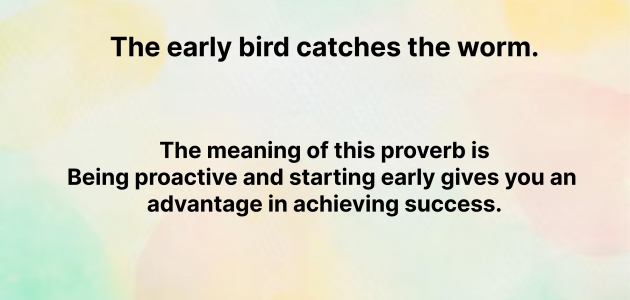
Fortune favors the bold.
The proverb “Fortune favors the bold” is an ancient one, most likely originating from Latin. It is a proverb that has inspired countless people, from business entrepreneurs to political activists. It refers to the idea that taking risks and going against the grain can often lead to success, or as the proverb puts it, “Fortune favors the bold.”
In this modern age, taking risks has become even more important. With rapid technological advances, the global economy is constantly in flux. This means that those who are successful are often the ones who are willing to break the status quo and take risks. Those more timid and slow to act can quickly be left behind in the new business landscape.
The proverb “Fortune favors the bold” applies to business and any area of life where one can take risks. Regarding relationships, taking risks can lead to rewarding and meaningful experiences. Regarding career, taking risks can open up new opportunities and lead to success. Even on a personal level, taking risks can lead to new and exciting experiences.
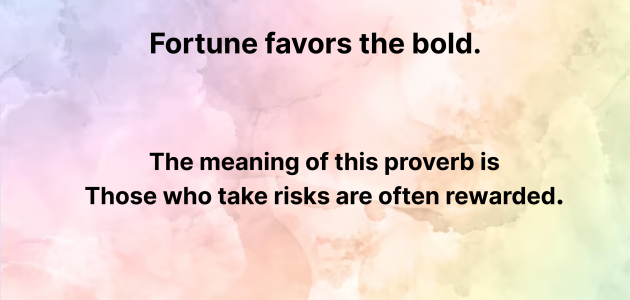
Rome wasn’t built in a day.
The proverb “Rome wasn’t built in a day” is one of the most famous proverbs in English. It is used to offer a reminder of the power of patience and perseverance in achieving a goal.
In its most basic interpretation, this proverb means that achieving any great feat or accomplishment takes time and effort. Rome, the ancient city, was not built in a mere day but over centuries. The same principle applies to any great endeavor; it takes time, hard work, and dedication to accomplish the desired outcome.
This proverb doesn’t just apply to tangible projects or constructions but also to intangible goals. Whether it is starting a business, writing a book, learning a new language, or achieving a promotion, the same principle applies. These things take time and effort, and it can be easy to become discouraged if the desired goal isn’t achieved quickly.
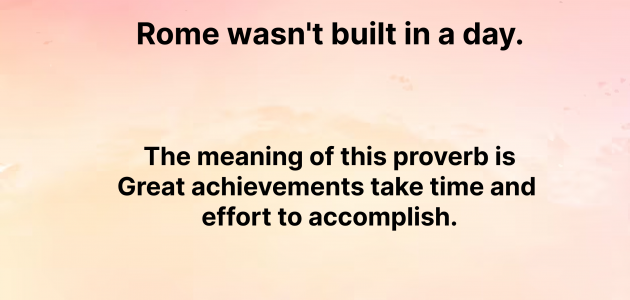
Read Also: Common Words Pronunciation: British vs American English
The grass is always greener on the other side.
“The grass is always greener on the other side” is a popular saying used for centuries. It has become a proverb because it so accurately sums up the human experience of envy and discontentment. This proverb describes situations when people compare their current situation with what they think they could have if they were in someone else’s shoes.
The proverb can be interpreted in many ways and applies to many different aspects of life. Generally speaking, it speaks to comparing our current circumstances to those of other people and feeling a sense of envy or longing because we think their life is better than ours. We often think the grass must be greener on the other side because we can’t see what’s happening. We may think that other people have it all and that our lives are somehow lacking. This is a natural feeling, but it’s important to remember that the grass is not always greener on the other side.
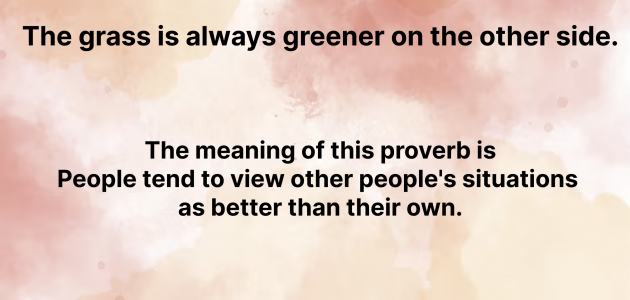
The pen is mightier than the sword.
The proverb “The pen is mightier than the sword” has been used since the early 1800s. The proverb speaks to the power of the written word and its ability to have a far greater impact than physical force.
English author Edward Bulwer-Lytton first published the proverb in his play “Richelieu; Or the Conspiracy” in 1839. He wrote, “Beneath the rule of men entirely great, the pen is mightier than the sword.” Since then, the phrase has been used to express the power of the written word and its ability to influence and persuade.
At its core, the proverb implies that words have the potential to be more powerful than physical force. This can be seen in various contexts, from literature to politics to everyday life. A persuasive argument can be far more effective than a physical altercation and can cause people to rethink their beliefs and ideas.
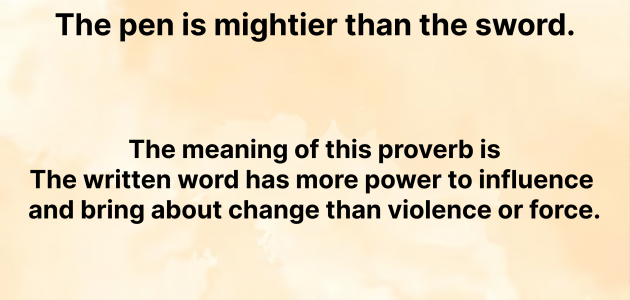
There’s no smoke without fire.
The proverb ‘There’s no smoke without fire’ is a very old adage that has been around for centuries. It is used to suggest that when there is evidence of something happening, it is likely true. In other words, behind every accusation, there is likely some truth.
The origins of this proverb are unclear, but it has been used in many languages and cultures throughout history. It was found in print in the early 16th century, suggesting that it has been around for a long time.
This proverb is sometimes used to suggest that if there is a rumor or accusation, then it is likely that there is some truth to it. It can also remind us to be careful what we believe, as rumors can spread and become exaggerated.
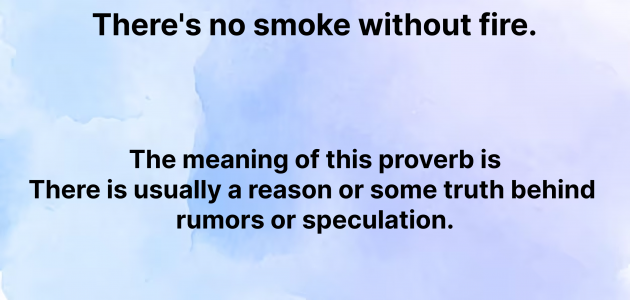
Read Also: 20 most attention grabbing longest words in English!
Time heals all wounds.
“Time heals all wounds” is a reminder that time is a great healer. In other words, no matter how deep or painful the wound is, it will eventually heal over time. This proverb is a way of saying that the pain and suffering of a situation will eventually fade away.
The proverb can be seen as a call to patience. It implies we should wait for the wound to heal naturally, even in the worst times. We should not rush to force healing, as it will come in time. In some cases, the wounds may never fully heal, but the pain will at least lessen as time passes.
It also speaks to the importance of resilience. We must have the strength to endure pain and suffering and to find the courage to keep going. We must remember that there is always hope, even in our darkest moments. With enough time, we can find ways to cope and eventually heal.

In closing
So, these famous English proverbs can be a great addition to your English vocabulary and can be used in related situations to sound more like a native speaker. Furthermore, if you are learning English and want to improve your English, Zoundslike is a great online language learning game that you can use for free. Download it now and begin your English journey.
FAQs
Q.1 What are English proverbs?
English proverbs are short, traditional sayings that convey a piece of wisdom or advice. They are widely used in English-speaking cultures to express common truths or offer guidance concisely and memorably.
Q.2 Why are proverbs important in English language learning?
Proverbs play a crucial role in language learning as they provide insights into a language’s cultural and historical aspects. They help learners understand the nuances of the language, expand their vocabulary, and gain a deeper understanding of its idiomatic expressions.
Q.3 How can I use English proverbs in everyday conversations?
You can incorporate English proverbs into your conversations by using them in appropriate contexts. Pay attention to the meaning and relevance of the proverb and try to apply it when it fits a particular situation. This can add depth and richness to your communication.
Q.4 Are proverbs still commonly used in English today?
Yes, proverbs continue to be widely used in everyday English conversations, literature, and various forms of media. They have stood the test of time and remain integral to the language, reflecting cultural values and providing practical insights.
Q.5 Can proverbs have different interpretations?
Yes, proverbs can have multiple interpretations depending on the context and individual perspectives. The meaning of a proverb can also vary across different cultures and regions. When interpreting a proverb, it is essential to consider the context and the intended message.








